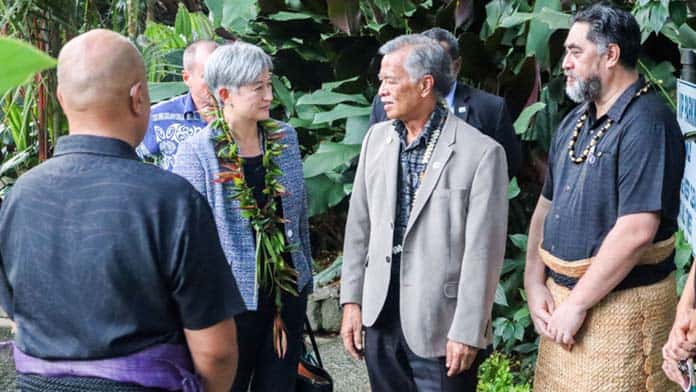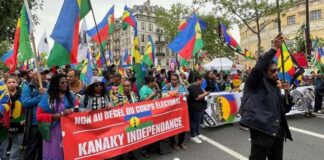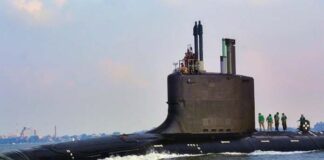Labor’s Foreign Minister, Penny Wong, has spent her first weeks in government shoring up Australia’s sub-imperialism in the southwest Pacific across the arc of Australian strategic interests.
She first joined Anthony Albanese in Japan for the Quad meeting, an anti-China alliance consisting of the US, Japan, India and Australia.
A visit to Fiji followed, where she addressed the Pacific Islands Forum (PIF), consisting of the 18 Pacific island nations, while Chinese Foreign Minister Wang engaged in an historic eight island-nation tour of the region, traditionally dominated by the regional power – Australia. Next was a trip to Samoa and Tonga.
Then it was off to Indonesia, again alongside Albanese, ostensibly for trade discussions with a country that was worth $7 billion in exports to Australia in 2020, as opposed to the $160 billion of exports to China that year.
But as the Melbourne Age pointed out in an editorial, the other aim was discussion on, “both countries’ efforts to manage relations with China.”
The newly minted Labor government is on a so-called “charm offensive”, where Foreign Minister Wong has said all the right things that other nations wanted to hear, such as promoting a changed commitment to action on climate change.
However, this was all designed to reassert the Australian ruling class’s rivalry for influence in the region against China.
Penny Wong admitted as much in Fiji, when she met the Fijian Prime Minister Frank Bainimarama, where she argued that “regional unity” faces “unprecedented challenges with COVID, climate change and strategic contest.”
The current “regional unity” is one where the Pacific island nations must accept Australian and US dominance, and agree to limit China’s influence. That “unity” is beginning to unravel with China offering alternative aid, investment and trade deals.
The first major break was in the Solomon Islands, which signed a security treaty with China in May, much to the alarm of the paranoid Australian mass media. However China’s proposed regional security deal involving ten Pacific nations was rebuffed during Wang Yi’s tour, with some nations fearing it could increase Chinese and Australian military tensions in the region.
But China did sign further economic and aid deals with Fiji and Samoa.
Despite efforts to portray China as the aggressor, Australia is helping to build a series of alliances aimed at encircling China and keeping it out of the local area. The most important are the Quad, the PIF and Indonesia.
So the new Labor government is proposing a Defence training school for the military forces of the Pacific island nations. But any Chinese security deals are viewed with total hostility.
The US already projects power across the Pacific from its bases in Guam, Okinawa and the Philippines.
Drawing in Japan and India, long time rivals of China, is designed to block China across the vast area now talked about as the Indo-Pacific.
The Indonesian archipelago also straddles the Indian and Pacific oceans, and dominates the maritime choke points.
Climate change
Australia is supposedly addressing the Pacific island nations’ desire for action on climate change.
But there are limits to Australia’s success in the charm offensive.
Pacific island nations are looking for more than just words on climate. They want meaningful action by an Australian government. At the next PIF in July, The Saturday Paper reported that “Labor’s climate pledges will be heavily scrutinised” by PIF leaders who “are going to want more and they’ve already made that clear.”
The climate change targets the Albanese government is committed to are still too low for 2030 and 2050 because of Labor’s loyalty to the fossil fuels of Australian capitalism. Fiji’s Prime Minister Frank Bainimarama has called on Australia to “phase out coal”. Yet this is something Labor has no intention of doing. In fact it supports the expansion of coal mining, with coal still making up 23 per cent of Australian export earnings.
The Labor government has already ruled out going beyond the targets it took to the election. So it won’t be increasing its efforts to the actual level necessary to deal with the climate crisis.
Penny Wong as Opposition spokesperson on Foreign Affairs told the Guardian in late April that as Foreign Minister she would like to “spend more on aid” but that it was also important for a Labor government to be “fiscally responsible”.
After the climate crisis, the PIF nations rate the issue of West Papuan independence from Indonesia as next on their agenda, as they “have always regarded West Papuans as part of their family”. They will be bitterly disappointed by Labor’s refusal to do any better than the Liberals in helping out a “family member”.
The Labor government remains fully committed to Indonesian control over West Papua. The same was true under the last Labor government, with then Prime Minister Julia Gillard refusing to even raise the issue when she met then Indonesian President Yudhuyono in Bali in November 2011.
Just as PM Gillard met the Indonesian President during a background of West Papuan revolt and deaths at the hands of the Indonesian police and military, a similar background is playing out in West Papua for Foreign Minister Wong today. As is the same shameful silence.
Australian strategic and defence policy is not about protecting ordinary people or keeping them safe. It is about securing continued profits for the BHPs, Rio-Tintos, and Visyboards in Australia and their almost $3 trillion worth of investments worldwide.
Working class people in Australia have every reason and every right to oppose Australian sub-imperial machinations, whether it be by a Liberal or Labor government, because our lives depend upon resisting those plans.
By Tom Orsag






